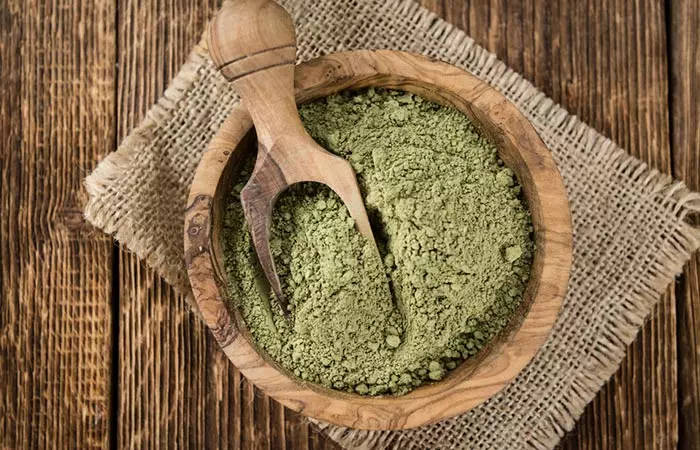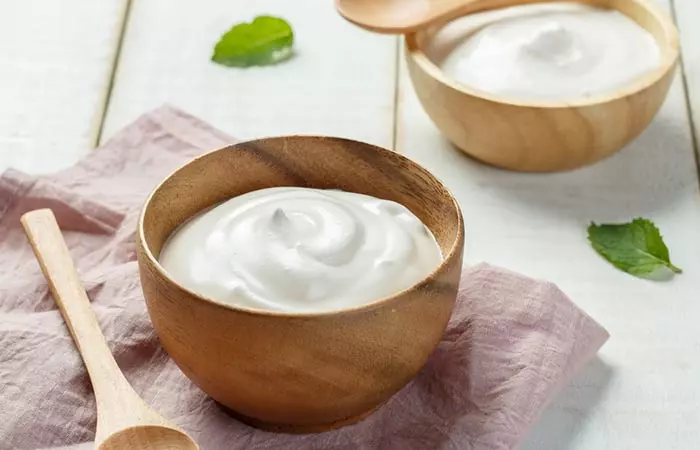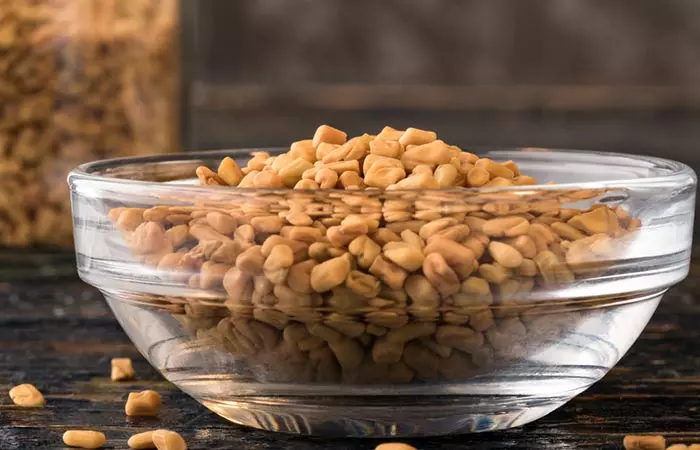Fenugreek—A Brief Introduction
Scientific Name—Trigonella foenum-graecum ( 2) Origin—Western Asia, Southern Europe, and Middle-East Other Names—Methi (Hindi), Mentulu (Telugu), Ventayam (Tamil), Uluva (Malayalam) What Are Its Benefits? Fenugreek seeds improve digestion, glucose tolerance, cholesterol levels, and reduce blood sugar levels. Who Can Use It? Everyone, especially people with type 1 and 2 diabetes and except those with fenugreek allergies. How Often? 10 gms of fenugreek seeds daily soaked in hot water. Caution People who take blood-thinning medications should not consume these seeds.
Abundantly available in the regions of North Africa, South Asia, and the Mediterranean regions, fenugreek comes in two variants—bitter-tasting seeds and leaves—that are incredibly beneficial for treating diabetic conditions. Almost all the medicinal properties of this ingredient can be attributed to the presence of various active compounds in it. Fenugreek contains phytochemicali Natural occurring compounds in plants to aid their ability to fight against infections from fungi, bacteria, and viruses. components and essential nutrients such as trigonellinei A plant hormone with significant advantages in the treatment of obesity, diabetes, and disorders of the central nervous system. , yamogenin, chlorine, calcium, copper, potassium, manganese, iron, zinc, and magnesium ( 3). Apart from its medicinal applications, fenugreek also has some culinary significance. The seeds of fenugreek are used as a spice in many Indian recipes.
Fenugreek For Diabetes – How Can It Help?
With millions of people being affected by this disease every minute, diabetes is turning out to be an epidemic, particularly in India. No, I’m not kidding! According to WHO, India holds the record of carrying the most diabetic cases in the millennium year (about 31,705,000) and is expected to grow over 100% in twenty years ( 4). This data shows how prevalent this lifestyle disease has become over the years, courtesy of unhealthy food habits, busy schedules, and lack of physical activities. This alarming rise calls for a dire need to get diabetes under control—either with the use of medicines or best available home remedies. Why opt for chemical-laced medicines when you have an effective ingredient like fenugreek right on your kitchen shelf (5). If you’re wondering how this plant’s seeds and leaves help treat diabetes, read on to learn more.
The Benefits Of Fenugreek
Fenugreek is a powerhouse of nutrients and has been a go-to for wellness enthusiasts. Curious about how it can boost your health? Scroll down to learn about the most popular fenugreek benefits and see how this little seed can make a big difference in your daily routine.
Improves Digestion: The seeds of fenugreek plant are a rich source of soluble fiber, which slows down the digestion process, increasing the absorption of sugar (6). Therefore, consuming fenugreek regularly helps reduce the blood sugar level or HbA1c successfully.
Improves Glucose Tolerance: It also helps enhance the glucose tolerance and reduces the amount of cholesterol efficiently (7). Lowers Cholesterol Levels: Fenugreek lowers the bad cholesterol or LDL and triglyceridesi Fats in the blood the body stores in case of excess energy. High levels of it increase the risk of heart attacks. while helping the release of good cholesterol or HDL (8 , 9).
Diabetes And Fenugreek Research
Several experts from different universities of the world have come up with amazing facts and benefits of fenugreek as a natural solution for diabetes . The studies evidently establish how eating fenugreek effects both Type 1 and Type 2 diabetes.
A study conducted in India reveals that adding 100 grams of defatted fenugreek seed powder added to the regular diet of insulin-dependent diabetic patients effectively reduces the fasting blood glucose level ( 10). Another research study reported that adding up to 15 grams of fenugreek powder to the meal of type 2 diabetes patients effectively reduced the increase of post-meal glucose levels (11).
Thus, it was established that regular intake of fenugreek could be genuinely useful for diabetes patients for glycemic control and insulin resistance (12). On the other hand, people who have a history of diabetes in the family, or whose diabetes level is in borderline should also eat fenugreek adequately. Now that you have your answers, scroll down to learn about using this blessed ingredient in your daily life!
How To Use Fenugreek Seeds For Diabetes
Fenugreek can be used in the treatment of diabetes in a number of ways. Have a look at these ideas for adding fenugreek in your daily routine:
1. Fenugreek Tea For Diabetes
Love your morning tea? Perfect! Now try this diabetes-friendly option that will not only satiate your love for tea but also make you healthier without causing a spike in your blood glucose.
1 tablespoon dried fenugreek leaves 1 teaspoon fenugreek seeds 1 cup water 1 teaspoon honey (optional)
2. Fenugreek, Plum Seed, Neem, And Bitter Gourd Powder For Diabetes
It may sound tedious and complicated, but trust me, this powder combination is the easiest way to keep diabetes under control if you can procure the ingredients.
1 tablespoon fenugreek powder 1 tablespoon jamun seed powder 1 tablespoon neem powder 1 tablespoon bitter gourd powder
3. Fenugreek Tincture For Diabetes
Tincture form is another way to use fenugreek for helping to support diabetes health.
2 tablespoons dried fenugreek leaves 2 tablespoons fenugreek seeds 1 cup boiling water
4. Fenugreek Seeds And Yogurt For Diabetes
Yogurt and fenugreek, with the former’s strong anti-inflammatory property, makes this one of the perfect combinations for helping to promote diabetes health.
1 tablespoon fenugreek seeds 1 cup plain yogurt
5. Fenugreek Seeds With Water For Diabetes
Here’s the soaking method, which is a popular way to use fenugreek for diabetes.
2 tablespoons fenugreek seeds 2 cups water
6. Fenugreek As A Spice For Diabetes
It’s true that fenugreek does not taste good. However, its bitter taste can be avoided by adding it with other ingredients in your recipes. So, go ahead and add it in your favorite curry or rice to reap the goodness of fenugreek. Note: One should always add this ingredient in the cooked food only when the food is ready. This is because the nutritional value of fenugreek reduces inevitably when it’s heated.
How Much Fenugreek To Take For Diabetes?
The recommended dosage of fenugreek falls somewhere between 2.5 grams to 15 grams, depending on the severity of the disease and patient’s age and physical stature. Studies have shown patients taking 12.5 grams of powdered fenugreek, divided equally into two times in a day, showing positive results (13). However, a lot of patients have shown improvement in their blood glucose levels after taking only 2.5 grams of fenugreek powder. Fenugreek is also available in capsule form, perfectly fit for those who strongly dislike the pungent and strong taste of it. Studies showed that diabetics who took a 500 mg capsule once or twice daily saw an improvement in their blood sugar levels (14). But make sure they are from a reliable brand before buying these capsules off the rack. So, now that you have the information about the proper dose of fenugreek for diabetes health, let’s look into its safety profile.
Potential Side Effects Of Fenugreek
While cooked fenugreek seeds are generally considered to be safe, the raw counterpart is an entirely different story. Don’t worry though, since the risk factors aren’t that dangerous. However, consuming raw fenugreek might cause a certain degree of discomfort.
Fenugreek seeds might cause gas and bloating in certain individuals when they are taken orally (15). Fenugreek is also known to react with certain medications, especially blood thinners and medicines prescribed to treat blood clotting disorders (16). Consult your physician before opting for a fenugreek treatment to treat your condition. If taken unprescribed, this ingredient, when combined with your regular diabetes medications, can lower the blood glucose levels dangerously. Fenugreek can induce early labor in a pregnant woman. Therefore, it’s better that you limit its usage to cooking only. Studies conducted on animals and humans indicate that excess consumption of fenugreek seeds may lead to DNA damage, neurological and neurobehavioral problems, anti-fertility issues, and high chances of miscarriage (17). Excess intake of fenugreek seeds may cause headaches, dizziness, nausea, diarrhea, and other digestive tract issues. It may also lead to a drop in blood sugar levels in some cases. Anecdotal evidence suggests that these seeds, when consumed in combination with other herbs like comfrey, may cause liver toxicity. They are not considered safe for breastfeeding and pregnant women as excess consumption during pregnancy may lead to birth defects (2).
What happens if you take fenugreek every day? Moderate consumption of fenugreek may help reduce blood cholesterol and sugar levels. Is fenugreek harmful to the liver? No. Moderate consumption of fenugreek has liver-protective activity (19). Is fenugreek good for kidneys? Yes. Fenugreek improves kidney function through its rich antioxidant properties (20). Does fenugreek raise blood pressure? Fenugreek may help lower blood pressure and is used as a traditional remedy for hypertension (21). Learn how fenugreek seeds can help manage diabetes. Check out this video to discover the amazing benefits of this natural remedy and keep your blood sugar levels in check!
Illustration: How To Use Fenugreek Seeds For Diabetes Treatment













![]()

